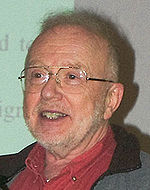- David Parnas
-
David Parnas 
Born 10 February 1941 Doctoral advisor Alan Perlis
Everhard Mott WilliamsDoctoral students Richard J. Lipton
Denise WoitDavid Lorge Parnas (born February 10, 1941) is a Canadian early pioneer of software engineering, who developed the concept of information hiding in modular programming, which is an important element of object-oriented programming today. He is also noted for his advocacy of precise documentation.
Biography
Parnas earned his Ph.D. at Carnegie Mellon University in electrical engineering. Parnas also earned a professional engineering license in Canada and was one of the first to apply traditional engineering principles to software design. He worked there as a professor for many years. He also taught at the University of North Carolina at Chapel Hill (U.S.), the Technische Hochschule Darmstadt (Germany), the University of Victoria (British Columbia, Canada), McMaster University in Hamilton, Ontario, and University of Limerick (Limerick, Republic of Ireland).
David Parnas received several awards and honors
- ACM "Best Paper" Award, 1979
- Norbert Wiener Award for Social and Professional Responsibility, 1987
- Two "Most Influential Paper" awards International Conference on Software Engineering, 1991 and 1995
- Doctor honoris causa of the Computer Science Department, ETH Zurich, Switzerland, 1986
- Fellow of the Association for Computing Machinery, 1994
- Doctor honoris causa of the Faculté des Sciences Appliquées, Université catholique de Louvain, Belgium, 1996
- ACM SIGSOFT's "Outstanding Research" award, 1998
- IEEE Computer Society's 60th Anniversary Award, 2007
- Doctor honoris causa of the Faculty of Informatics, University of Lugano, Switzerland, 2008
- Fellow of the Institute of Electrical and Electronics Engineers (IEEE), 2009
- Ehrendoktorwürde der Technische Universität Wien (Dr. Tech.H.C.), Vienna Austria , 2011
Work
Modular design
In modular design, his double dictum[citation needed] of high cohesion within modules and loose coupling between modules is fundamental to modular design in software. However, in Parnas's seminal 1972 paper On the Criteria to Be Used in Decomposing Systems into Modules, this dictum is expressed in terms of information hiding, and the terms cohesion and coupling are not used.[1]
Technical activism
Dr. Parnas took a public stand against the US Strategic Defense Initiative (also known as "Star Wars") in the mid 1980s, arguing that it would be impossible to write an application of sufficient quality that it could be trusted to prevent a nuclear attack.[2] He has also been in the forefront of those urging the professionalization of "software engineering" (a term that he characterizes as "an unconsummated marriage"). Dr. Parnas is also a heavy promoter of ethics in the field of software engineering.
Stance on academic evaluation methods
Dr. Parnas has joined the group of scientists which openly criticize the number-of-publications-based approach towards ranking academic production. On his November 2007 paper Stop the Numbers Game, he elaborates on several reasons on why the current number-based academic evaluation system used in many fields by universities all over the world (be it either oriented to the amount of publications or the amount of quotations each of those get) is flawed and, instead of generating more advance of the sciences, it leads to knowledge stagnation.
Quotations
- ...it is almost always incorrect to begin the decomposition of a system into modules on the basis of a flowchart. We propose instead that one begins with a list of difficult design decisions or design decisions which are likely to change. Each module is then designed to hide such a decision from the others.[1]
- I would advise students to pay more attention to the fundamental ideas rather than the latest technology. The technology will be out-of-date before they graduate. Fundamental ideas never get out of date. However, what worries me about what I just said is that some people would think of Turing machines and Goedel's theorem as fundamentals. I think those things are fundamental but they are also nearly irrelevant. I think there are fundamental design principles, for example structured programming principles, the good ideas in "Object Oriented" programming, etc.[3]
- Artificial intelligence has the same relation to intelligence as artificial flowers have to flowers. From a distance they may appear much alike, but when closely examined they are quite different.[4]
See also
References
- ^ a b Parnas D.L. (December 1972). "On the Criteria To Be Used in Decomposing Systems into Modules" (PDF). Comm ACM 15 (12): 1053–8. doi:10.1145/361598.361623. http://www.cs.umd.edu/class/spring2003/cmsc838p/Design/criteria.pdf.
- ^ Parnas D.L. (December 1985). "Software aspects of strategic defense systems". Comm ACM 28 (12): 1326–35. doi:10.1145/214956.214961.
- ^ "David Parnas on Software Engineering". http://faculty.indwes.edu/bcupp/lookback/SoftwareEngineering/DavidParnas.Poster.htm. Retrieved 2011-01-11.
- ^ "Software Aspects of Strategic Defense Systems.". http://www.cs.helsinki.fi/u/przybils/courses/CBD06/papers/p1326-parnas.pdf. Retrieved 2011-09-2.
Further reading
- Hoffman, Daniel M.; Weiss David M. (Eds.): Software Fundamentals – Collected Papers by David L. Parnas, 2001, Addison-Wesley, ISBN 0201703696.
External links
- McMaster University (Hamilton, Ontario, Canada)
- Queen´s University (Kingston, Ontario, Canada)
- University of Limerick profile and CV
- Stop the numbers game
- IEEE Computer Society's 60th Anniversary Award
Software engineering Fields Concepts Orientations Models Development modelsOther models- Automotive SPICE
- CMMI
- Data model
- Function model
- Information model
- Metamodeling
- Object model
- Systems model
- View model
Modeling languagesSoftware
engineers- Kent Beck
- Grady Booch
- Fred Brooks
- Barry Boehm
- Ward Cunningham
- Ole-Johan Dahl
- Tom DeMarco
- Martin Fowler
- C. A. R. Hoare
- Watts Humphrey
- Michael A. Jackson
- Ivar Jacobson
- Craig Larman
- James Martin
- Bertrand Meyer
- David Parnas
- Winston W. Royce
- Colette Rolland
- James Rumbaugh
- Niklaus Wirth
- Edward Yourdon
- Victor Basili
Related fields Categories:- 1941 births
- Canadian computer scientists
- Carnegie Mellon University alumni
- Carnegie Mellon University faculty
- Computer pioneers
- Formal methods people
- Fellows of the Association for Computing Machinery
- Living people
- McMaster University faculty
- Software engineers
- Software engineering researchers
- University of Limerick faculty
Wikimedia Foundation. 2010.
